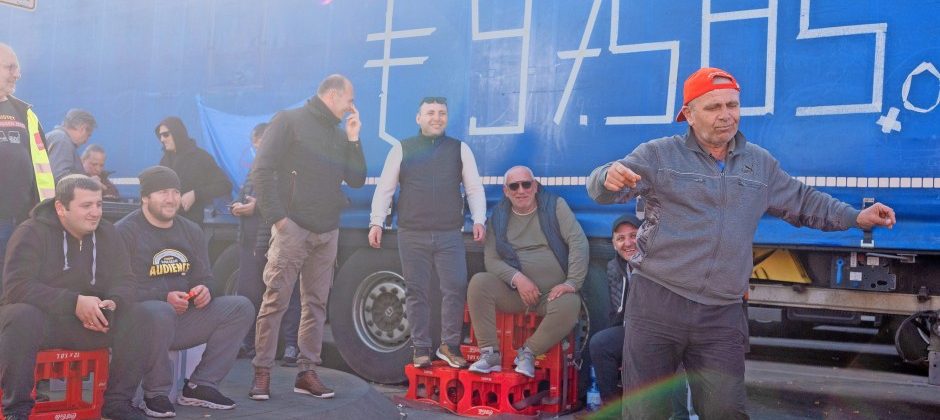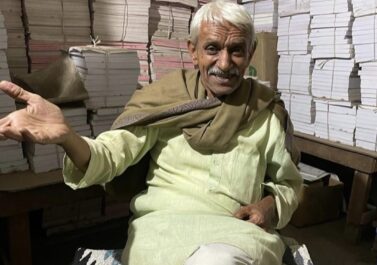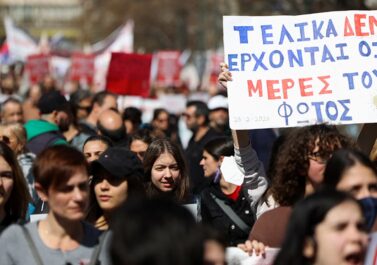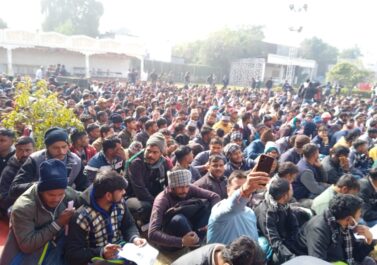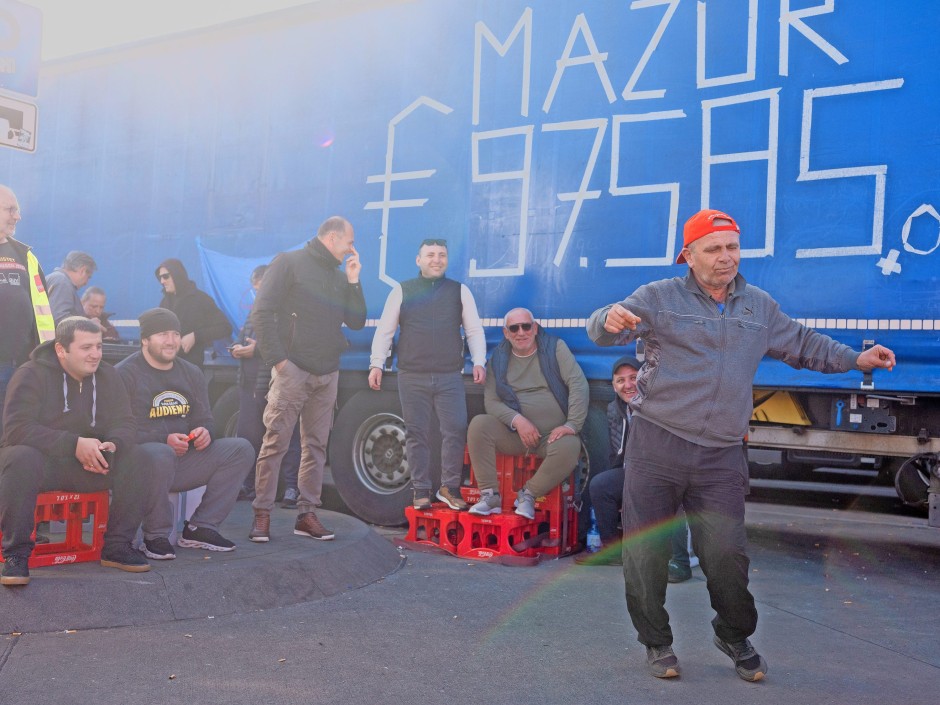
A comrade from the German working class online forum ‘Chefduzen‘ sent us this text on recent struggles of migrant truck drivers over outstanding wages.
People tell all kinds of stories about Germany. Order, perfection, rules, bureaucracy and laws supposedly holding everything together.
A look at the world of work reveals a different picture. While in large companies, such as the car industry, a sophisticated system of trade unions, works councils and labour laws ensures peace and order with relatively good working conditions, the rest of the economy runs on autopilot. Working conditions beyond the large companies are becoming increasingly precarious. These diverse rules and regulations of German order do not play such a big role in these sectors and one wonders why extreme exploitation does not break down more often, why work still goes on relatively undisturbed.
It is probably the belief in German rules and laws that is in people’s bones. The fear of doing something forbidden paralyses people. German laws only allow strikes under very specific conditions. The German labour laws go back to the Nazi judge Nipperdey, who also made a career after fascism. As the first president of the Federal Labour Court, he shaped the right to strike, such as the ban on wildcat strikes.
But unrest has come to the German order. Labour migrants are not very interested in complicated German rules; they want an income and that is often withheld from them in Germany. They feel unrepresented and know that they have to defend themselves. The previously invisible workers suddenly appear in the public eye with spontaneous work stoppages and protest actions.
It is extremely spectacular when food couriers or harvest workers no longer want to be cheap service providers in a rich country, when construction workers occupy cranes or lower banners from house roofs, when striking lorry drivers build a trailer park on a German service station with their lorries.
The impact of the shockwave of these disputes on the system of exploitation can be guessed by looking at the reactions of occficial politics. They didn’t just say, “you’re not allowed to do that under German law”, but the Federal Minister of Labour himself went to the cycle couriers on wildcat strike. Even politicians from the migrant workers’ home countries showed up at the scene of self-organised industrial action. The autopilot that keeps the economy running so well in this country is fear. But when that fear is lost, there is a flurry of activity among representatives of politics, business and trade unions. The fear of losing one’s job no longer exists for professional HGV drivers; there are enough jobs. The German hauliers’ association, BGL, speaks of a shortage of up to 100,000 drivers in Germany.
How 60 truckers forced a disgraceful transport company to pay outstanding wages in a six-week fight
The European transport sector is a world apart. Deregulation has taken extreme forms, the labour market has been opened up further to Eastern Europe and the already poor minimum conditions for drivers are hardly checked by the authorities. Wild West conditions are part of today’s transport sector. Drivers are contracted through sub-subcontractors or are classified as independent contractors. Deductions for alleged damage to vehicles are a common way to depress wages.
The Mazur group, based in Poland, drives for western clients, but the conditions of the drivers are so bad that Mazur has a hard time to recruit workers in Poland. Mazur hires drivers further east, even beyond the borders of Eastern Europe, such as Nepal or the Philippines.
The history-making Gräfenhausen strike involved drivers from Georgia and Uzbekistan. In April 2023, when wages had not been paid for more than a month, drivers in car parks in Hanover, Gräfenhausen, South Tyrol and Switzerland stopped work, a good 100 in all. There was intimidation and violent attacks. Some of the drivers gave up, others wanted to gather as a larger group. A Georgian driver contacted the relevant trade union in Georgia and asked for advice. They contacted the Dutch trade union FNV, the Road Transport Due Diligence Team (RTDD) and the DGB. The DGB asked the German Freight Forwarders’ Association (GBL) what they thought of the situation. It was agreed that the conflict should be resolved in the most orderly way possible and without open confrontation.
The Gräfenhausen service station became the venue for the multinational industrial dispute. Within a short time, a variety of solidarity activity developed in support of the strike, both institutional and spontaneous, self-organised. For example, a German colleague produced a Youtube video in which he pointed out the defective showers at the service station and asked colleagues and residents to provide facilities from sports clubs. German truckers handed out water bottles and cigarettes. Local residents brought home-baked cakes. The DGB-affiliated counselling organisation Fair Mobility provided translations, and a board member of the freight transport association signalled his goodwill by arranging the repair of the showers and giving the strikers a donation from the association. The DGB had a board official on site and declared the support of the trade union centre. The police sought a legal settlement and declared the industrial action a “standing protest”.
This dispute developed considerable momentum. The Polish company boss, Lukasz Mazur, showed up at the service station, declared the conflict over, that he could settle the last open questions with the drivers in Poland, and he had brought drivers in minibuses to bring back the vehicles that were on strike. When they learned that they were to move vehicles against the will of their colleagues, they refused to do the strike-breaking work. In the square, the daily life of the strikers was made more pleasant with many improvisations. Medical and dental care was provided on site and marquee grills and huge pots of goulash made it possible to fight with full stomachs. Trade unions turned out to show their solidarity with the strikers. The FAU was there, as well as unions that have little to do with professional drivers or that are not known as particularly class-struggle organisations. In Gräfenhausen you could smell the scent of a workers’ struggle as it is not known in Germany. People brought goodies and in return decorated the trucks with their union logos and flags.
The boss, Lukasz Mazur, did not want to accept the embarassing defeat of the failed strike-breaking attempt and tried to deal a second blow against the workers. This time he wanted to impose himself by force and with great showmanship. He came with the ‘Rutkowski Patrol’, a notorious security company in Poland, accompanied by a team from the right-wing TV station Patriot24. Dressed in the martial outfit of a special paramilitary unit with an armoured vehicle said to have been developed for use by the Polish army in Afghanistan, the aim was to demonstrate how a Polish entrepreneur deals with unruly workers. The outcome of the action did not meet the transport boss’ expectations. When the thugs tried to storm the drivers’ cabs, the drivers blocked access to the trucks with their bodies. The police arrived and arrested the boss and 18 members of the Rutkowski gang. Pictures of the failed paramilitary operation against strikers went around the world.
Photo and film messages came in from colleagues in solidarity from around the globe, with South Korean truckers making the biggest impression: in an elaborate choreography, more than 1000 colleagues shouted: “Truckers of Europe, stay strong! Win the strike with the power of international solidarity!”
In Warsaw, Krzysztof Rutkowski and the Mazur management announced a protest action in front of the German embassy, complaining against the obstruction of Polish entrepreneurship by German authorities and the vilification of their companies by German media. Activists from the Inicjatywa Pracownicza (IP) union were already there waiting, with a demand in German: “Pay the workers!”
The unusual permanent strike rally on the A5 motorway in Hesse was attended by countless journalists. Supporters turned up with solidarity greetings and donations and the rest area became a popular destination for politicians from almost all parties, first local politicians, then federal politicians, until EU parliamentarians also arrived. In the process, the strikers learned not to let go of their struggle. They elected the Dutch trade unionist and former truck driver Edwin Atema as their spokesperson and negotiator, but the decisions remained up to the strikers.
Their Polish boss tried to divide the truck drivers’ community by approaching individual drivers and transferring parts of the outstanding wages to them. By this time, the cohesion was so massive that attempts to divide them had no chance. The drivers took advantage of the great media interest and knew of the sympathy of the population for this industrial action. They organised open air press conferences to inform the public that there could only be one solution for all drivers and that they would not budge from it. Each new trick to avoid paying the outstanding bills spurred the drivers’ creativity to escalate the dispute and engage in other forms of strike. They reached out to the public with the threat of a hunger strike and they turned the car park into a political stage by emblazoning their demands on the tarpaulins of the trucks: “Mazur no Money” could be read there and each driver wrote in huge letters the exact outstanding amount on the respective truck, in total a sum of around 100,000€.
Circling the waggons!
The drivers not only refused to work. They defended their vehicles and material against removal. Several vehicles were still loaded and were secured by the drivers as a bargaining chip. The loaded trucks were parked in such a way that they could only be approached with great difficulty. Now the loads became a means of pressure. The strikers opened tarpaulins and showed shipping documents in front of TV cameras. Among the clients were Ikea, Volkswagen, DHL and General Electric. This became a major issue in the media, which the companies tried to talk their way out of. But General Electric did not deny the order, they suffered from the delay in transport and threatened heavy contractual penalties.
The drivers knew that the tide had turned and their boss could no longer play for time. They demanded written confirmation that there would be no penalty deductions or legal proceedings against them. One hour after the last missing euro had arrived in the last driver’s account, they would be ready to hand over keys and vehicle documents.
The drivers won outright, shouting, “Mazur checkmate!” and Edwin Atema appraised the fight with the oft-quoted words, “They were treated like animals and fought like lions and won”. The joy of victory gave way to melancholy as they bid farewell to their fellow combatants.
Epilogue
The smoke of struggle and from the barbecue station at the motorway car park had hardly cleared when politicians and trade union officials congratulated the truckers, who were on their way back in the meantime, on their success. The officials promised to continue the fight at their instititional positions and to ensure better conditions in European transport.
Stefan Körzell from the DGB national executive board did a good job, because the DGB statement declares solidarity with the drivers, which also calmed the police, and the basic supply of food from the unions filled the drivers’ stomachs. The support of various individual trade unions was also more than just showmanship on the part of the unions. The trade unionists literally thrived to be part of a real industrial action, beyond the ritualised German strikes. It smelled of class struggle and adventure. A special honourable mention goes to the people of the Catholic Workers Movement, who were not interested in the TV cameras, but were there to help where they were needed and knew how to communicate via smartphone app.
But the exuberant hopes in the DGB, which were displayed in various left publications, should be taken with a pinch of salt. These publications claim that the DGB is good for surprises and even supported a wildcat strike. On the contrary though, from the perspective of the DGB this was not a DGB strike and it was not a collective bargaining dispute or other struggle against the class enemy. The DGB turned up in support of the interests of the German transport employers’ association that had problems with the East European competition – a competition from companies which use Rambo methods and brought unrest into the well-rehearsed system of exploitation in Germany.
The announced clean-up of the criminal, exploitative structures in the European transport industry will likely turn out to be largely hot air. At the national section conference of the service trade union Verdi, where representatives from postal services, transport and logistics meet, there was still a live link to the strike camp on the motorway; but this militant mood did not translate into trade union practice. Verdi did not make it its’ business to support and strengthen committed union members in this sector. Drivers had the impression that their commitment was seen as disruptive to the usual ‘business as usual’ approach of the trade unions.
Official politics has also become quieter, and in the EU Parliament, many well-sounding proposals disappear in the various committees. The real improvements are likely to remain on a small scale. A slight increase in road transport controls can be expected as a gesture of goodwill. Otherwise, pressure from the German transport industry has long been aimed at better access to migrant labour beyond the EU. Poland and the Baltic States are currently a link, because their work contracts qualify the drivers to work in Germany, although direct employment here is not possible. Mafia-like and megalomaniac employers have proven to be a factor of insecurity in times of driver shortage. Concrete work is being done on renewing the bureaucratic rules to allow other driving licences, languages and nationalities in the labour market of the Western European region.
Real movement has taken place elsewhere. Migrant workers with seemingly no rights have banded together and won against a Goliath. Not only was the criminal employer threatening, Germany and its laws may have seemed more threatening. It was not legal to take the trucks as a bargaining chip and even to confiscate the loads, but they got away with it because the situation was favourable. The highways are full of angry drivers who are similarly mistreated. A widespread dispute in the transport sector would be a serious threat to the economy. The news that even in Germany the underdogs can fight and win spread not only in the transport sector. People from the organisation Stollipinovo also travelled to the strikers. This is a Bulgarian migrant workers’ organisation that was involved in organising the biggest migrant worker protests in Germany for years after the death of the temporary worker Refat Süleyman at Thyssenkrupp Duisburg. The Uzbek and Georgian drivers were recently contacted by colleagues from other companies who wanted to know specifically how they had led this struggle. The fuse for the next industrial action is already burning.
+++ breaking news +++
While writing this text I received the news that today the next truck drivers’ wildcat strike has started. Again, vehicles are gathering at the Gräfenhausen rest area. And this time, too, it is about the contractor Lukasz Mazur, who owes his workers several months’ wages.
19.7.2023
